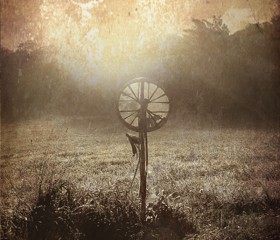For many years I felt the call to visit the Wáshitá battlefield. But as I drove across country the days were so long I could not manage the extra time. Finally, in November of ’02, on a long drive to Santa Fe I felt compelled to stop.
A half-hour before sunset I drove into a small Oklahoma village with a monument. In the center of an asphalt parking lot atop a prairie knoll was a display describing a winter’s battle between Custer’s cavalry and a band of Cheyenne. In 1868, despite the flag given him by President Lincoln assuring him and his people safety, the Peace Chief Black Kettle died in the November snow, shot down with his wife crossing the frozen river. I had come to pay my respects to the many Cheyenne men, women, and children who died that day in what historians today call The Washita Massacre.
Wáshitá
Where once grew Buffalo and Indian Grass now low stalks of Broom Sedge shown copper in the falling light. As I walked through brittle stalks of prairie flowers, grass circles dotted the ground like lodges. Blackbirds had fallen silent in their roost where the low willows grow and a marsh hawk stirred the sky above sleeping seeds.
The Wáshitá was just a simple prairie draw, near freezing, with a dusting of snow brightening the red water heavy with clay. As I walked down a gentle slope to be near it I could feel my spirit rising.
Moving through the trees along the bank my feet sank into the untrodden soil. Feeling lighter still, I stepped briskly along the water’s edge, the copper seeds brushing my fingers and palms. Here and there, the red earth was windswept and bare as a gentle snow began to fall.
I rose like a feather in the air as the marsh hawk called.
Beneath low clouds the sun lit my breaths and the grass whipped my hands as I began to run!
Over mounds of grass and earth, I ran through stalks of flowers like a fool, afraid someone might see me, afraid someone might mistake my joy for disgrace. I galloped through the milkweed and mustard and butterfly weed. I skittered like a curly calf, head into the wind, returning to the circle of the herd.
I chased the white spot of the marsh hawk’s tail, here and then gone again in an aerial slight of hand. Into the whisper of flying snow I laughed out loud as I crested the knoll where the road met the sand.
The hawk turned and I stopped, sitting with what I had just done. My heavy breaths hung in the whitening air, and then elated, I looked down at my red soles. With a single long stride I stepped out of the field complete, over the fence and back on the street.
Then the robe that I had carried across the years fell straight away. It slipped from my shoulders into a heap, warm and dark at my feet. It fell onto that soft red earth, heavy and heart-first, like a buffalo into snow, white and wizening into sleep.
Click on the gold link above or on the embed below to go to the video “Wáshitá” on the Snow on Water YouTube channel. From the Poetry playlist, it features the poem written there as well as my original music and imagery.




